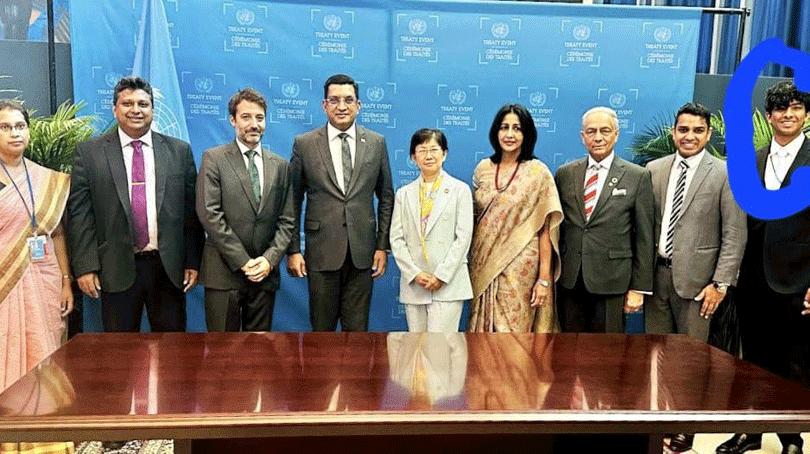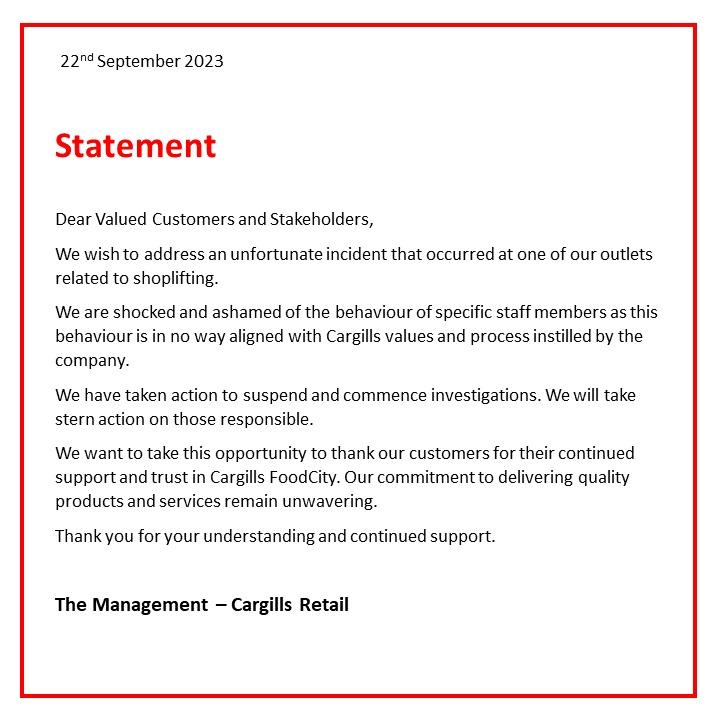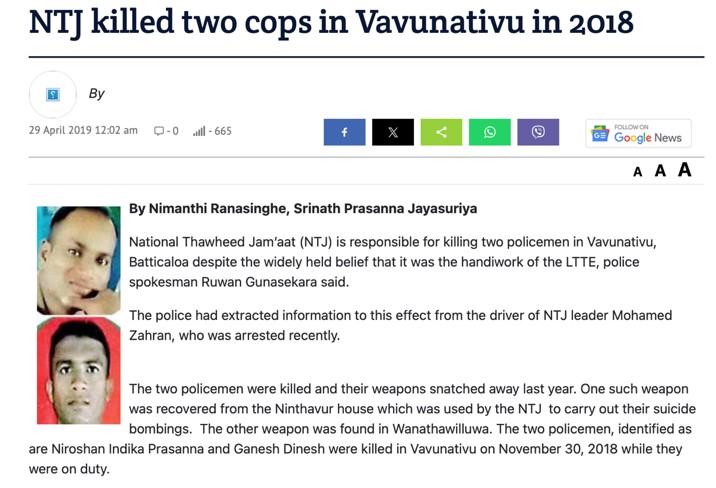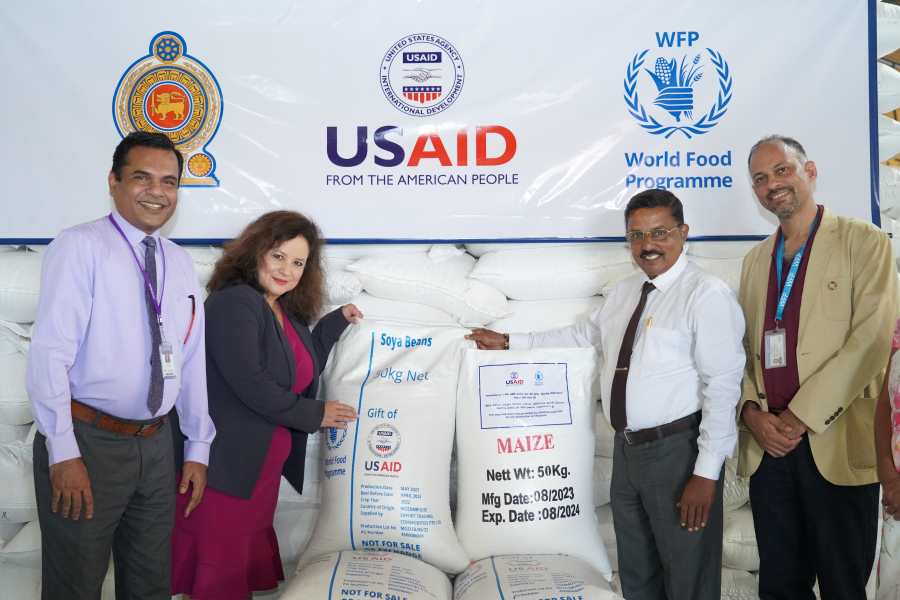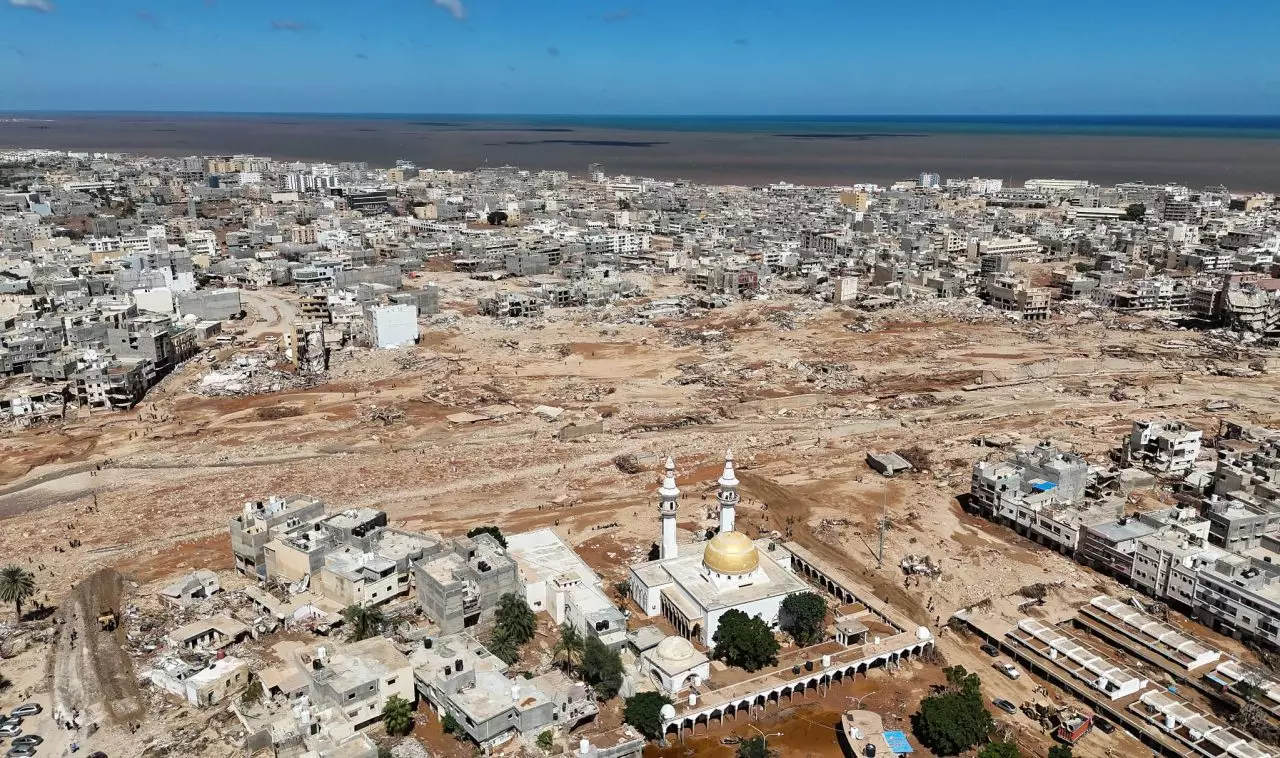Courtesy The New Cold War By Jonathan Cook, originally published on declassifieduk.org.
The reality of the West’s trademark current foreign policy – marketed for the past two decades under the principle of a Responsibility to Protect” – is all too visible amid Libya’s flood wreckage.
Many thousands are dead or missing in the port of Derna after two dams protecting the city burst this week as they were battered by Storm Daniel. Vast swaths of housing in the region, including in Benghazi, west of Derna, lie in ruins.
The storm itself is seen as further proof of a mounting climate crisis, rapidly changing weather patterns across the globe and making disasters like Derna’s flooding more likely.
But the extent of the calamity cannot simply be ascribed to climate change. Though the media coverage studiously obscures this point, Britain’s actions 12 years ago – when it trumpeted its humanitarian concern for Libya – are intimately tied to Derna’s current suffering.
The failing dams and faltering relief efforts, observers correctly point out, are the result of a power vacuum in Libya. There is no central authority capable of governing the country.
But there are reasons Libya is so ill-equipped to deal with a catastrophe. And the West is deeply implicated.
Avoiding mention of those reasons, as Western coverage is doing, leaves audiences with a false and dangerous impression: that something lacking in Libyans, or maybe Arabs and Africans, makes them inherently incapable of properly running their own affairs.
‘Dysfunctional politics’
Libya is indeed a mess, overrun by feuding militias, with two rival governments vying for power amid a general air of lawlessness. Even before this latest disaster, the country’s rival rulers struggled to cope with the day-to-day management of their citizens’ lives.
Or as Frank Gardner, the BBC’s security correspondent, observed of the crisis, it has been compounded by Libya’s dysfunctional politics, a country so rich in natural resources and yet so desperately lacking the security and stability that its people crave.”
The media has been firing out these terms like bullets from a machine gun”
Meanwhile, Quentin Sommerville, the corporation’s Middle East correspondent, opined that there are many countries that could have handled flooding on this scale, but not one as troubled as Libya. It has had a long and painful decade: civil wars, local conflicts, and Derna itself was taken over by the Islamic State group – the city was bombed to remove them from there.”
According to Sommerville, experts had previously warned that the dams were in poor shape, adding: Amid Libya’s chaos, those warnings went unheeded.”
Dysfunction”, chaos”, troubled”, unstable”, fractured”. The BBC and the rest of Britain’s establishment media have been firing out these terms like bullets from a machine gun.
Libya is what analysts like to term a failed state. But what the BBC and the rest of the Western media have carefully avoided mentioning is why.
Regime change
More than decade ago, Libya had a strong, competent, if highly repressive, central government under dictator Muammar Gaddafi. The country’s oil revenues were used to provide free public education and health care. As a result, Libya had one of the highest literacy rates and average per capita incomes in Africa.
That all changed in 2011, when Nato sought to exploit the Responsibility to Protect” principle, or R2P for short, to justify carrying out what amounted to an illegal regime-change operation off the back of an insurgency.
The supposed humanitarian intervention” in Libya was a more sophisticated version of the West’s similarly illegal, Shock and Awe” invasion of Iraq, eight years earlier.
Then, the US and Britain launched a war of aggression without United Nations authorisation, based on an entirely bogus story that Iraq’s leader, Saddam Hussein, possessed hidden stockpiles of weapons of mass destruction.
The West manufactured a pretext to meddle directly in Libya”
In Libya’s case, by contrast, Britain and France, backed by the United States, were more successful in winning a UN security resolution, with a narrow remit to protect civilian populations from the threat of attack and impose a no-fly zone.
Armed with the resolution, the West manufactured a pretext to meddle directly in Libya. They claimed that Gaddafi was preparing a massacre of civilians in the rebel-stronghold of Benghazi. The lurid story even suggested that Gaddafi was arming troops with Viagra to encourage them to commit mass rape.
As with Iraq’s WMD, the claims were entirely unsubstantiated, as a report by the British parliament’s foreign affairs committee concluded five years later, in 2016. Its investigation found: The proposition that Muammar Gaddafi would have ordered the massacre of civilians in Benghazi was not supported by the available evidence.”
The report added: Gaddafi’s 40-year record of appalling human rights abuses did not include large-scale attacks on Libyan civilians.”
Bombing campaigns
That, however, was not a view prime minister David Cameron or the media shared with the public when British MPs voted to back a war on Libya in March 2011. Only 13 legislators dissented.
Among them, notably, was Jeremy Corbyn, then a backbencher who four years later would be elected Labour opposition leader, triggering an extended smear campaign against him by the British establishment.
When Nato launched its humanitarian intervention”, the death toll from Libya’s fighting was estimated by the UN at no more than 2,000. Six months later, it was assessed at nearer 50,000, with civilians comprising a significant proportion of the casualties.
Citing its R2P mission, Nato flagrantly exceeded the terms of the UN resolution, which specifically excluded a foreign occupation force of any form”. Western troops, including British special forces, operated on the ground, coordinating the actions of rebel militias opposed to Gaddafi.
Meanwhile, Nato planes ran bombing campaigns that often killed the very civilians Nato claimed it was there to protect.
It was another illegal Western regime-overthrow operation – this one ending with the filming of Gaddafi being butchered on the street.
Slave markets
The self-congratulatory mood among Britain’s political and media class, burnishing the West’s humanitarian” credentials, was evident across the media.
An Observer editorial declared: An honourable intervention. A hopeful future.” In the Daily Telegraph, David Owen, a former British foreign secretary, wrote: We have proved in Libya that intervention can still work.”
But had it worked?
Two years ago, even the arch-neoconservative Atlantic Council, the ultimate Washington insider think-tank, admitted: Libyans are poorer, in greater peril, and experience as much or more political repression in parts of the country compared to Gaddafi’s rule.”
It added: Libya remains divided politically and in a state of festering civil war. Frequent oil production halts while lack of oil fields maintenance has cost the country billions of dollars in lost revenues.”
The idea that Nato was ever really concerned about the welfare of Libyans was given the lie the moment Gaddafi was slaughtered. The West immediately abandoned Libya to its ensuing civil war, what President Obama colourfully called a shitshow”, and the media that had been so insistent on the humanitarian goals behind the intervention” lost all interest in post-Gaddafi developments.
Libya was soon overrun with warlords, becoming a country in which, as human rights groups warned, slave markets were once again flourishing.
As the BBC’s Sommerville noted in passing, the vacuum left behind in places like Derna soon sucked in more violent and extremist groups like the head-choppers of Islamic State.
Unreliable allies
But parallel to the void of authority in Libya that has exposed its citizens to such suffering is the remarkable void at the heart of the West’s media coverage of the current flooding.
No one wants to explain why Libya is so ill-prepared to deal with the disaster, why the country is so fractured and chaotic.
Just as no one wants to explain why the West’s invasion of Iraq on humanitarian” grounds, and the disbanding of its army and police forces, led to more than a million Iraqis dead and millions more homeless and displaced.
This pattern repeats because it serves a useful end for a West led from Washington that seeks complete global hegemony”
Or why the West allied with its erstwhile opponents – the jihadists of Islamic State and al-Qaeda – against the Syrian government, again causing millions to be displaced and dividing the country.
Syria was as unprepared as Libya now is to deal with a large earthquake that hit its northern regions, along with southern Turkey, last February.
This pattern repeats because it serves a useful end for a West led from Washington that seeks complete global hegemony and control of resources, or what its policymakers call full-spectrum dominance.
Humanitarianism is the cover story – to keep Western publics docile – as the US and Nato allies target leaders of oil-rich states in the Middle East and North Africa that are viewed as unreliable or unpredictable, such as Libya’s Gadaffi and Iraq’s Saddam Hussein.
A wayward leader
WikiLeaks’ release of US diplomatic cables in late 2010 reveals a picture of Washington’s mercurial relationship with Gaddafi – a trait paradoxically the US ambassador to Tripoli is recorded attributing to the Libyan leader.
Publicly, US officials were keen to cosy up to Gaddafi, offering him close security coordination against the very rebel forces they would soon be assisting in their regime-overthrow operation.
But other cables reveal deeper concerns at Gaddafi’s waywardness, including his ambitions to build a United States of Africa to control the continent’s resources and develop an independent foreign policy.
Libya has the largest oil reserves in Africa. And who has control over them, and profits from them, is centrally important to Western states.
The WikiLeaks cables recounted US, French, Spanish and Canadian oil firms being forced to renegotiate contracts on significantly less favourable terms, costing them many billions of dollars, while Russia and China were awarded new oil exploration options.
Still more worrying for US officials was the precedent Gaddafi had been setting, creating a new paradigm for Libya that is playing out worldwide in a growing number of oil producing countries”.
That precedent has been decisively overturned since Gaddafi’s demise. As Declassified reported, after biding their time, British oil giants BP and Shell returned to Libya’s oilfields last year.
In 2018, Britain’s then ambassador to Libya, Frank Baker, wrote enthusiastically about how the UK was helping to create a more permissible environment for trade and investment, and to uncover opportunities for British expertise to help Libya’s reconstruction”.
That contrasts with Gaddafi’s earlier moves to cultivate closer military and economic ties with Russia and China, including granting access to the port of Benghazi for the Russian fleet. In one cable from 2008, he is noted to have voiced his satisfaction that Russia’s increased strength can serve as a necessary counterbalance to US power”.
Submit or pay
It was these factors that tipped the balance in Washington against Gaddafi’s continuing rule and encouraged the US to seize the opportunity to oust him by backing rebel forces.
The idea that Washington or Britain cared about the welfare of ordinary Libyans is disproved by a decade of indifference to their plight – culminating in the current suffering in Derna.
The West’s approach to Libya, as with Iraq, Syria and Afghanistan, has been to prefer that it be sunk into a quagmire of division and instability than allow a strong leader to act defiantly, demand control over resources and establish alliances with enemy states – creating a precedent other states might follow.
Small states are left with a stark choice: submit or pay a heavy price.
Gaddafi was butchered in the street, the bloody images shared around the world. The suffering of ordinary Libyans over the past decade, in contrast, has taken place out of view.
Now with the disaster in Derna, their plight is in the spotlight. But with the help of Western media like the BBC, the reasons for their misery remain as murky as the flood waters.
